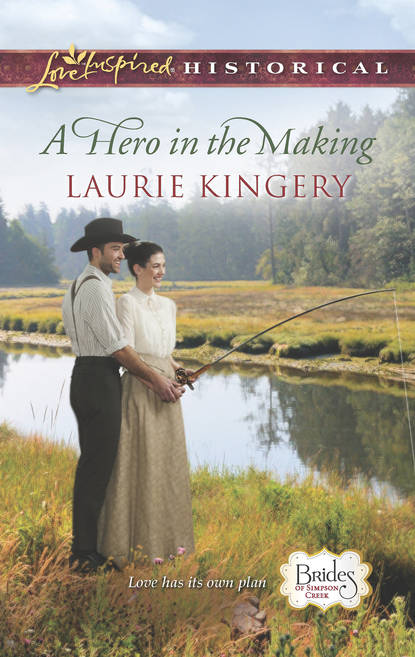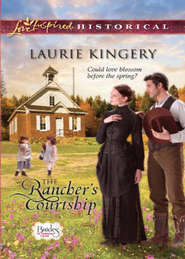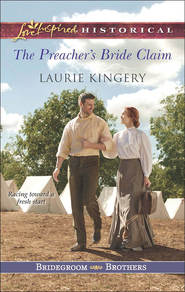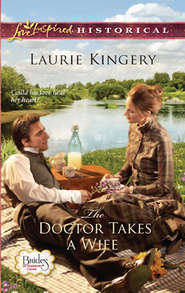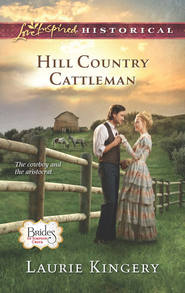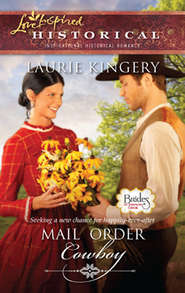По всем вопросам обращайтесь на: info@litportal.ru
(©) 2003-2025.
✖
A Hero in the Making
Настройки чтения
Размер шрифта
Высота строк
Поля
He stared at her, his headache and her disbelief making him even testier than he might otherwise be under the circumstances. “For the sheriff, maybe. Why would you care? I’m behind bars anyway, aren’t I?”
She ignored that. “Dr. Walker says as long as you woke up, you aren’t gonna die. Oh, yes, Sheriff Bishop had the doctor check your noggin all right and proper. You’re awake, so I guess you’ll survive.”
Having to put up with the lash of Ella Justiss’s tongue, along with the pain in his head, was surely more than any man ought to have to bear. “Where’s the sheriff? I want to talk to him,” he said.
“You’ll just have to wait. The sheriff and his deputy went to see if they could catch up with that snake-oil-selling fraud and I agreed to sit with you—since I don’t have a café to run, thanks to your friend.”
Nate doubted they’d catch Salali. If the scoundrel had taken to the road right after wrecking the saloon and café, he must have gotten a good head start. Salali wasn’t fool enough to dawdle after a spree like that, nor would he stick to the main roads.
“The sheriff’ll never catch him,” he muttered.
“I wouldn’t be so sure,” Ella argued. “And that tall tale your friend was spouting about saving the Indian chief from a bear—that was all made-up moondust, wasn’t it? And he was just spouting gibberish, not real Cherokee, wasn’t he?”
“Probably,” he admitted. “Woman, if you’re just going to torment me unmercifully till the sheriff gets back, get the rope and the lynch mob and put an end to my misery. I hurt too much to listen to you carp at me.”
That stopped her. She had the grace to look ashamed. “D-doctor said I was to give you this when you woke, if you were still in pain,” she said, reaching for a cup sitting on a nearby bench.
“What is it? Poison, to finish me off?” he said, eyeing it, and her, balefully.
“No, it’s not, and how dare you accuse the good doctor of such a thing? It’s willow-bark tea, and his wife brewed it herself. It’ll help your headache, though maybe you deserve to keep it.”
Despite what she’d said, she held it out to him. The bars were just wide enough to pass the cup through. He noticed she was careful not to let their fingers touch.
The remedy was bitter, but he drank it all.
“Well, since you’re awake and all, I’m going to go help Mr. Detwiler clear up the mess your friend made,” Ella said, turning to go.
“He’s not my friend,” he ground out. “I was tired of his drinking and his gambling and I was about to part company with him, though I hadn’t told him yet.” The truth was, he rued the day he’d met Salali and been in such a hurry to find a cheap way to get to the railroad, that he’d thrown in with the man. If he hadn’t taken the easy way out of his transportation problem, he would now not have to atone for what Salali had done. “Besides,” he added, standing and gripping the bars. “How can you just leave? You’re supposed to be guarding me, aren’t you?”
She shrugged. “Sheriff said I could, soon as you were awake. It’s not as if you could escape, anyway.”
He didn’t know why the idea of her leaving bothered him so. Hadn’t he just been complaining about the way she had plagued him?
“But I’m hungry,” he said, hoping he looked pitiful enough that she wouldn’t laugh at him. “I haven’t eaten anything since that sandwich you sold me for lunch yesterday, and—” he glanced out of the cell’s one high window “—it’s got to be at least noon, I reckon.”
“Then it’s a pity your friend destroyed my café, isn’t it?” she retorted sweetly. “It’s not as if the hotel cook’s going to feed you. Mrs. Powell doesn’t give anything away.”
He played his last card. “Doesn’t the Bible say you’re supposed to feed the hungry? Sure it does—remember the passage where it says ‘I was in prison, and you visited me’? You did the visiting part, Miss Ella. Don’t you reckon you could take pity on a poor hungry man and do the feeding part, too?”
She studied him, chewing on her lip. “Anyone can quote scripture, Mr. Bohannan,” she said. “I could quote ‘Man does not live by bread alone,’ but I’ll just give you part of the breakfast I had planned to serve at the café this morning. It’s a wonder some stray dog didn’t find it first, but my friend Maude rescued the makings from where I left them on the back step of the boardinghouse and went ahead and cooked them. I had some, and I’ll fetch you a portion. The rest is for the sheriff and his deputy when they get back.”
Ella went over to the desk that occupied the center of the sheriff’s office part of the jail, removed the cover from a dish and scooped up a hearty helping of bacon and eggs onto a tin plate she got off a shelf. She tossed a couple of biscuits onto it and passed it under the bottom bar, along with a cup of water from the pitcher on the desk. Then, as he murmured his thanks, she went out the door without another word.
The eggs and bacon were cold, but it was food, and soon the ache in his belly had subsided. The ache in his head had faded to a dull whisper, too.
Now all he could do was wait for Sheriff Bishop and his deputy to return. He doubted they’d have Salali with them when they did. And if he was being realistic, by the time he was freed, it was unlikely he’d able to catch up with Salali, either. The wily charlatan would be gone by the time he was able to make his way to the canyon hideout.
He wasn’t sleepy, even now that his belly was full, so it seemed he would have an indefinite amount of time to contemplate what he would do after he was freed—assuming they didn’t try to hold him responsible for what his erstwhile employer had done.
He wanted to stick to his original plan and to shake the dust of Simpson Creek off his boots as soon as possible. Somehow he’d get a horse, even if he had to stay here long enough to earn the price of it. He’d head for the railroad terminus at Council Bluffs, taking jobs along the way to earn the price of a ticket to San Francisco. He’d never work in a medicine show—he didn’t want to be someone’s shill ever again.
Fortunately he had more cards in his deck. His father had passed along a number of skills to his son before he’d died. Nate hadn’t valued them then—he’d been too full of big plans and as little common sense as most wet-behind-the-ears young’uns possessed.
Something about Miss Ella’s stricken face as she spoke about the wreck of her café nagged at him. He couldn’t leave until he assured himself she would be all right. Surely she had parents who would take her in, or relatives, or friends. Maybe even someone who could afford to help her rebuild. Perhaps she had a beau who’d been pressing her to marry him, yet some stubborn independent streak had driven her to prove she could take care of herself. Perhaps this incident would force her to be practical and marry the man. A young woman should be cooking in her own kitchen, with babies crawling at her feet, and a hungry husband on the way home for supper. Serving sandwiches to rowdy cowboys and saddle tramps was for some plain old maid or a widow, not for a pretty thing like Ella Justiss.
That was it. If Bishop let him go, he’d linger just long enough to ensure himself that Miss Ella had some reasonable options. Then he was San Francisco bound.
Chapter Four
Ella parted the batwing doors of the saloon and walked inside. She’d expected that Detwiler would have made some start at cleaning up the mess, but the ruined tables and chairs, the broken glass, were still strewn everywhere. George Detwiler, Dolly and Trudy were sitting on the floor along the wall, sniffling and swollen-eyed, staring dully ahead of them.
“What’re y’all doing?” Ella demanded. “Don’t you think you should at least sweep up the broken glass?”
Detwiler studied her with doleful eyes. “Won’t make no diff’rence, Miss Ella. How’m I gonna fix all this? Those medicine-show swindlers took what was in the till an’ every whiskey bottle they didn’t drink. I don’t have anything t’sell, even if customers were willing to stand while they drink.”
Ella looked around. “You still have the piano,” she said, spotting it against the far wall. Amazingly, it had escaped the destruction. Had Robert Salali possessed some innate respect for a musical instrument that had caused him to leave the piano alone during his destructive spree?
“Ain’t no one gonna pay to come hear me play,” he said.
It was true—Detwiler could only pick out a few tunes poorly.
“Well, you can’t leave the place like this,” she said, making a sweeping gesture at the piles of splintered wood and glass. “Unless you’re planning on tearing it down and selling your lot.”
At her words, the two saloon girls set up a keening wail. If there was no saloon, they had no livelihood, any more than Detwiler did.
“Come on,” she said. “Get the brooms out and let’s start cleaning up. We could at least separate the trash and firewood from what could be repaired. Some of those tables and chairs just need new legs, looks like.”
“An’ who’s gonna repair them?” he asked, though without heat. “I’m no carpenter.”
“Hank Dayton’s got a lathe at the mill,” Dolly mumbled. “I seen it once.”
“What does that matter?” Detwiler muttered. “Hank Dayton’s a skinflint who doesn’t give anything away. I don’t know how to operate a lathe.”
“So we need someone who does,” Ella said, going behind the bar and fetching the two brooms that were propped in the corner. She handed Detwiler one of them. “Let’s get started clearing this mess, and maybe one of us will think of something.”
“You girls kin go home,” Detwiler said to Dolly and Trudy. “I’ll let you know what I’m going to do—soon’s I figure it out.”
Ella didn’t try to stop them. There were only two brooms, and the women hadn’t seemed inclined to do more than sit and blubber. She started sweeping, intending to leave the café till last, for she was too afraid Detwiler would give way to despair again if she left him on his own.
Lord, if you’re up there, we could use some help. She’d never quite believed that the Deity was interested in aiding Ella Justiss, or He would have done so years ago at the asylum, but she figured she’d offer Him the opportunity, at least.
She left Detwiler to clean his saloon while she went to do the same with her café. She had soon swept the debris into the center of her area and came back to help Detwiler with his larger one. For a time both of them plied their brooms in silence, but as the afternoon went on, the interruptions began—the saloon’s faithful customers stopping in to see if the rumor was true that there was no whiskey or poker games to be had in Simpson Creek because of the vandalism in the saloon. Ella ignored them and kept sweeping, but Detwiler stopped to tell each of his customers what had happened. Ella rather thought he was enjoying the sympathy gained with each encounter, but as these patrons began to build up inside the saloon, chattering with each other over where they would have to go to get their whiskey and card games, and doing nothing to help, even Detwiler began to get testy. Ella was past exasperated at having to ask gents to move while she swept the areas they had been standing in.
Finally, to Ella’s relief, Detwiler roared an order for all of them to leave, saying he’d put up a sign when the saloon was open again. Then he took a piece of a broken table, and a brush and bootblacking he’d dug up from who knew where and handed them to Ella.
“Your book learnin’s probably better than mine, Miss Ella,” he said. “Write on the bottom a’ this tabletop Closed Till Further Notice, an’ I’ll prop it up outside.”
If George only knew how haphazard her “book learning” had been, Ella thought as she bent to her task. The asylum orphans’ schooling had been hit-or-miss, since they couldn’t attend if they were needed to work in the laundry or the kitchens or the superintendent’s wife’s garden. But when Ella was able to go to class, she’d paid attention with a desperate intensity, for she’d known even then it was her ticket to a better life.





